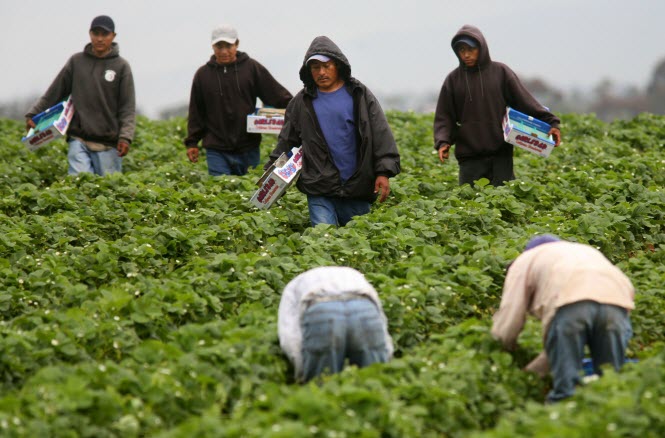Detention Camps the Answer for Border Crisis?
By Carl Takei ACLU National Prison Project Seventy-two years ago, U.S. military officials labeled Japanese-Americans “an enemy…
By Carl Takei ACLU National Prison Project Seventy-two years ago, U.S. military officials labeled Japanese-Americans “an enemy…
The American Civil Liberties Union Foundation of Southern California, along with the national ACLU, American Immigration Council,…
by Tia Will I believe in the value of the Constitution of the United States of America….
By Tia Will For those of you who have not seen the movie, here is a brief…
By Hector Villagra When Juan Pablo Guerrero Diaz left El Salvador to come to the U.S., his…
by Tia Will On July 3rd, Davis Patch reported that an 11 year-old boy was transferred from…
We interrupt this coverage of the elections for a bit of reality that seems more like unreality….
Last week, the NBA had to deal with owner Donald Sterling’s racism caught on tape. They had…
This was originally written in early December following the passing of Mandela – My first memories of…

The second time was the charm as a little over a year after legislation sponsored by Sacramento Assemblymember Roger Dickinson died in committee, Governor Jerry Brown signed AB 218 into law.
The bill prohibits requesting criminal background information on the initial employment application for local and state government employees, with the goal of reducing unnecessary barriers to employment for the one in four adult Californians who have an arrest or conviction record. California joins nine states and over 50 cities and counties across the United States that have adopted similar legislation.
 By Val Dolcini
By Val Dolcini
Comprehensive Immigration Reform: Pro-Growth and Pro-Agriculture- Earlier this year, the U.S. Senate passed a commonsense immigration reform measure in a strongly bipartisan fashion. This was an important step in the right direction – especially for producers, farm workers and rural communities.
The historic legislation passed by the Senate provides a pathway to earned citizenship for the 11 million people who are in our country today without authorization. They will have to go to the back of the line, pay fines and settle taxes they owe our nation.

One of the big questions for President Barack Obama’s speech would be for him to figure out how to thread the needle – to exalt the progress of the last fifty years while not becoming complacent about the challenges that remain.
How would he honor the spirit of those who fought for civil rights, and yet understand that, while we have come far, we have not come nearly far enough?
 This week we commemorate the 50th anniversary of the March on Washington which is best known perhaps for the speech delivered by Martin Luther King, Jr., a speech ironically that his advisers did not want him to give. Sadly, 50 years later only one of the speakers from the original march remains alive – John Lewis, now a Congressman, who was just 23 years old at the time of the speech.
This week we commemorate the 50th anniversary of the March on Washington which is best known perhaps for the speech delivered by Martin Luther King, Jr., a speech ironically that his advisers did not want him to give. Sadly, 50 years later only one of the speakers from the original march remains alive – John Lewis, now a Congressman, who was just 23 years old at the time of the speech.
It likely goes without saying that 50 years ago, the speakers who addressed the huge throngs could not envision a world in which the African-American Attorney General would be speaking to a crowd 50 years later, and that the African-American President would have a special address from the Lincoln Memorial on the exact date of the anniversary.
 For the first time this week, the door is open for the possibility of meaningful prison reform. Earlier this week, Eric Holder, the much-criticized US Attorney General, speaking at the American Bar Association, said the words that many have been waiting to hear since the Obama Administration began in 2009: “Too many Americans go to too many prisons for far too long, and for no truly good law-enforcement reason.”
For the first time this week, the door is open for the possibility of meaningful prison reform. Earlier this week, Eric Holder, the much-criticized US Attorney General, speaking at the American Bar Association, said the words that many have been waiting to hear since the Obama Administration began in 2009: “Too many Americans go to too many prisons for far too long, and for no truly good law-enforcement reason.”
His speech and modest policy change marks only the beginning. As the Economist wrote this week, “America has the world’s largest prison population. China, which has more than four times as many people and nobody’s idea of a lenient judiciary, comes a distant second. One in 107 American adults was behind bars in 2011 – the highest rate in the world – and one in every 34 was under ‘correctional supervision’ (either locked up or on probation or parole). A black man in America is 3.6 times more likely to be incarcerated than a black man in 1993 in South Africa, just before apartheid ended.”
 Ten years ago last month I suffered a very serious blood clot. It got lodged in my heart as a pulmonary embolism and part of it broke off and ended up in my right shoulder. It was the most painful experience of my life and it took nearly a week for the doctors to figure out what was wrong with a 30-year-old who was otherwise in good health.
Ten years ago last month I suffered a very serious blood clot. It got lodged in my heart as a pulmonary embolism and part of it broke off and ended up in my right shoulder. It was the most painful experience of my life and it took nearly a week for the doctors to figure out what was wrong with a 30-year-old who was otherwise in good health.
The pain was such that they were providing me with morphine combined with Percocet to combat it. As the pain lessened, I became increasingly aware of being doped up and eventually preferred a little pain to feeling “out of it.”
 By Jeff Adachi
By Jeff AdachiNote: The following remarks were given by San Francisco Public Defender Jeff Adachi on Aug. 1, 2013 at the Criminal Litigation Ethics Seminar at UC Hastings College of the Law.
Good afternoon. I want to thank UC Hastings and Professor Rory Little for inviting me to speak at this Ethics Symposium.
This year is very special for public defenders and the indigent defense community. 2013 marks the 50th Anniversary of the Gideon v. Wainwright decision. It’s hard to believe that just five decades ago, a person did not have a right to a public defender or court appointed- lawyer except in a death penalty case. Were it not for Clarence Earl Gideon, a poor inmate in a Florida prison convicted of burglarizing a pool hall who wrote a handwritten petition to the US Supreme Court demanding a lawyer, we might not have this basic right that we now take for granted. But even today, the right to counsel is far from fully realized. Public defender offices, for the most part, are still treated as the stepchildren of the criminal justice system, under resourced and understaffed.
 Even after being acquitted on the most serious charge, aiding the enemy, Bradley Manning still faces life in prison after being found guilty of numerous lesser charges, as the Obama administration works hard to make an example of him after he leaked classified reports that showed that the U.S. Government was lying to the American people as well as to its allies.
Even after being acquitted on the most serious charge, aiding the enemy, Bradley Manning still faces life in prison after being found guilty of numerous lesser charges, as the Obama administration works hard to make an example of him after he leaked classified reports that showed that the U.S. Government was lying to the American people as well as to its allies.In reading the verdict, Col. Denise Lind ruled that the facts were insufficient to convict Mr. Manning of what would be the military equivalent of treason. She found that, for instance, the video Collateral Murder did not qualify as “national defense” information.
 By Diane Carlson
By Diane Carlson It’s only been a little over a week now since the verdict in the Trayvon Martin case and folks are already moving on. Some other new shiny object in the media has our attention – oooh, look, royal baby! Our heads turn so fast we almost get whiplash. But our heads turn because we will do everything we can to not talk about the history and legacy of racism in this country.
No matter how many Trayvons or Oscar Grants or Marissa Alexanders, no matter how many times folks of color are profiled, no matter how many times an almost all white jury gets to “decide” if racism exists or not, we will wiggle out of it with a quick, “Zimmerman was Hispanic” or “racism was over 50 years ago” and look away as swiftly as possible.

In the movie Remember the Titans, the fictionalized account of a true story about the integration of a football team in early 1970s in Virginia, the football coach in an effort to forge unity brought his players to the site of Gettysburg to remind them that the struggles that they faced that day were not new, and had old and bloody antecedents.
Forty years later, we have made much progress in the battle for racial and social equality; however, we have recent reminders, that race remains as polarizing and salient an issue as it perhaps ever was, even if the form of that polarizing continues to evolve.

A year ago, Frontline did a report that found that the killings of black people by whites were more likely to be considered justified than the killings of white people by blacks. The problem, however, remains: how does one measure racial bias?
As we see in the George Zimmerman trial, the question is not only difficult, but it is polarizing.